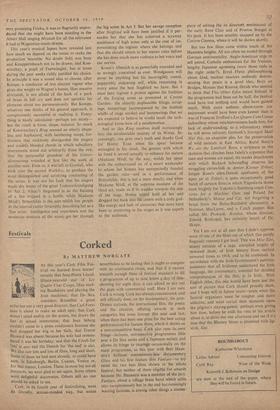Festivals
Corked
By MATTHEW NORG ATE
AT this year's Cork Film Fes- tival we learned from horses' mouths that Jean-Pierre Leaud, fifteen-year-old star of Les Quatre Cent Coups, likes read- ing Baudelaire and playing the
fruit machines; that De Sica
considers Rossellini a great artist but not a very good director; that Carl Fore- man is about to make an adult epic; that Cork doesn't mind nudity on the screen, but draws the line at sexual intercourse; that Jcan Seberg couldn't come to a press conference because she had dropped her wig in her bath; that Trevor Howard was absent because his wife had remem- bered it was his birthday; and that the Czech for `yes' is ano and the Danish for 'the end' is slut. We also saw lots and lots of films, long and short. Some of them we had seen already, or could have seen, in Edinburgh, Berlin, Cannes, Venice or, for that matter, London. These, in most but not all instances, we were glad to sec again. Some others were delightful discoveries. Others still no one should be asked to see.
Cork, in its fourth year of festivalising, went its friendly, serious-minded way, but seems
nevertheless to be feeling that it ought to compete with its continental rivals, and that if it cannot unearth enough films of festival standard to fill a programme of up to nine hours a day of film- showing for eight days it can afford to eke out the gaps with commercial stuff. Here I am sure Cork is wrong. Cork has always.concentrated, and still officially does, on the documentary, the post- Disney cartoon, the instructional film, the poetic and the . creative, offering awards in such categories but none (except this year and last, when there has been one prize for the best acting performance) for feature films, which it shows on a non-competitive basis. Cork also runs its ,own fringe—lectures, retrospective programmes (this year a De Sica series and a Japanese series), and allows its fringe to impinge occasionally on the main programme, as this year with Bert Haan- stra's brilliant commentary-less documentary Glass and his first feature film Fanfare—to my mind the two best films shown in the whole festival, but neither of them eligible for awards because Mr. Haanstra was a member of the jury. Fanfare, about a village brass band which splits into cacophonously but in the end harmonisingly warring factions, is among other things a master-
piece of editing (by its director), reminiscent of the early Rene Clair and of Preston Sturges at his peak. It has been sensibly snapped up by the Curzon Cinema, where it will be shown shortly.
But too few films came within reach of the Haanstra heights. All too often we waded through German sentimentality, Anglo-American urge to sell petrol, Catholic enthusiasm for the Vatican, lengthy Japanese agonising (were those reels in the right order?), Errol Flynn philosophising about God, nuclear reactors endlessly demon- strating that peace is a good idea, Boys on Bridges, Mouses that Roared, Oirish who seemed to think that This Other Eden meant Ireland. If the programme had been cut by half, the festival need have lost nothing and would have gained much. With more aesthetic elbow-room our enjoyment would have been even keener than it was of Francois Truffaut's Les Quatre Cent Coups (schoolboy whose mischievousness leads him, for lack of understanding, to a reformatory where he will never reform); Grzimek's Serengeti Shall Not Die, an exquisite plea for the preservation of wild animals in East Africa; Karel Reisz's We are the Lambeth Boys; a striptease to the skeleton that clinches Jean Jabely's argument that men and women are equal; the tender detachment with which Richard Scheinpflug observes his struggling circus-folk in Armer Kleiner Zirkus; Jorgen Roos's ultra-Danish apotheosis of the open air in Friluft; a quite exceptionally good batch of cartoon films in which Yugoslavia shone most brightly for Vukotic's Steinberg-esque Con- certo for a Machine Gun, and Poland for Nehrebecki's Mouse and Cat, not forgetting a brace from the Halas-Batchelor pheasantry, a Norman MacLaren, and a Czech puppet film called Mr. Prokouk, Acrobat, whose director, Zdenek Rozkopal, has certainly heard of Dr. Sk upa.
Yet I am not at all sure that I didn't approve ' most of one of the films out of which (for purely linguistic reasons) I got least. This was Mise Eire, ninety minutes of a saga, compiled largely of newsreel shots, of Irish history from earliest newsreel times to 1918, and to be continued. In accordance with the Irish Government's patriotic insistence that all Irishmen understand the Irish language, the commentary, essential for detailed comprehension of the film, is in Irish. With English titles, this one would have been just the sort of picture that Cork should proudly show, and 1 hope will in future years—years when the festival organisers must be tougher and more selective, and must curtail their demands upon the pilgrim's staying-power, perhaps even giving him time, before he ends his visit or his article about it, to drive out one afternoon and see if it's true that the Blarney Stone is plastered with lip- stick. Slut.






































 Previous page
Previous page